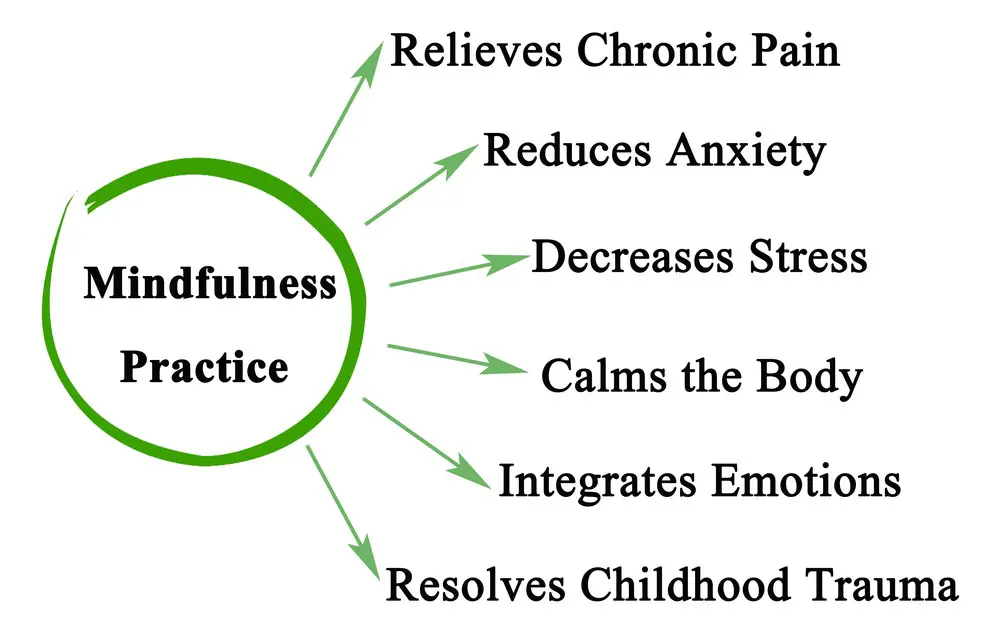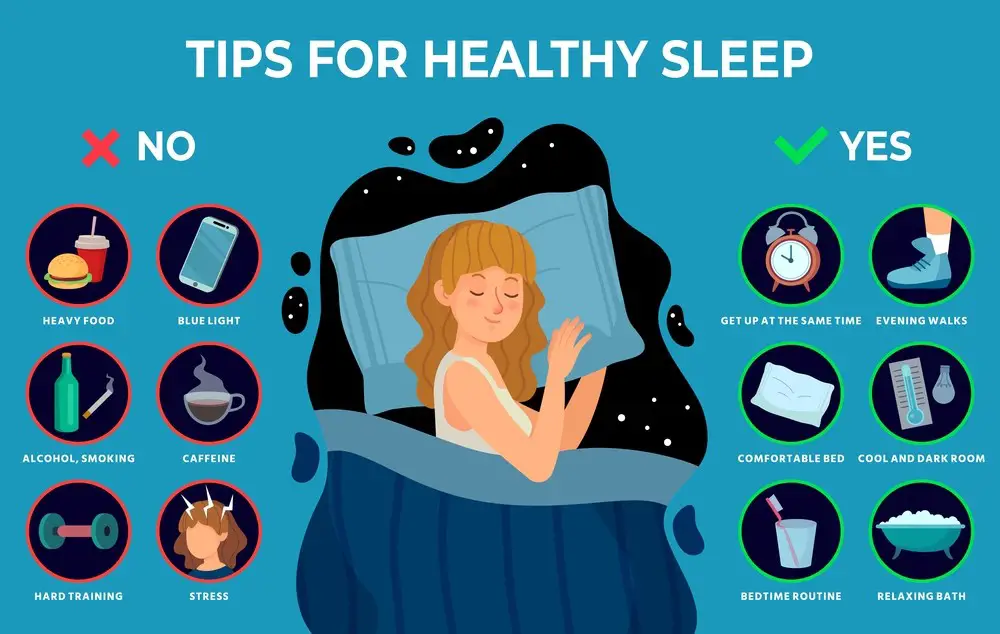As a BetterHelp affiliate, we receive compensation from BetterHelp if you purchase products or services through the links provided
In search of the most effective strategies for combating insomnia without medication, we turned to seven experts in wellness and psychology. From implementing a comprehensive bedtime routine to reducing screen time before bed, these wellness coaches and clinical psychologists share their top tips for a restful, medication-free sleep.
- Implement a Comprehensive Bedtime Routine
- Create a Calm Environment and Limit Stimulants
- Follow a Four-Step Nightly Process
- Establish a Personal, Consistent Pre-Sleep Routine
- Practice Mindfulness and Anchored Breathing
- Limit Caffeine and Alcohol Consumption
- Reduce Screen Time Before Bed
 Implement a Comprehensive Bedtime Routine
Implement a Comprehensive Bedtime Routine
Exercise regularly, preferably not too close to bedtime, and eat a few hours before bed. I often stretch, have a consistent bedtime, and don’t have a TV in the bedroom. My phone is eight feet from my head, and my room is painted in warm, soothing colors.
Also, I use lavender oil and other essential oils. I am learning to meditate and let go of the day, and I try not to do all my thinking when my pillow hits the bed. Most importantly, I avoid screen time and read a book before I sleep.
Becky Argue, Wellness Coach, Holtyn & Associates, LLC
Create a Calm Environment and Limit Stimulants
I know that many folks I work with are often told to practice meditation and to keep their environments cool, dark, and quiet. However, the devil is in the details.
I often find that ensuring your pets are not allowed in the bed (even if they whine for a bit—they will be okay!), that you avoid caffeine for at least six hours before bedtime, and that your brain has time to “settle down” by not playing video games for that last hour—those are the sneaky culprits that get overlooked.
Pets nap during the day and often toss and turn. Plus, they can prevent or restrict our movement in sleep (moving is needed for good sleep!). Caffeine is one of our “culturally encouraged” drugs, so it often gets overlooked, and I know many folks then use alcohol or marijuana to bring themselves back down, which creates an unhealthy cycle. Cut them out. Also, make sure your raids or battleground matches in whatever game you like to play have adequate time to be completed before you try to catch some Z’s!
David Charles, Clinical Psychologist, Meridian Behavioral Health
Follow My Four-Step Nightly Process
First, journal or free-write anything that comes to your mind from the day you just had or the days ahead. (Keep a notebook and pen by the bed instead of exposing yourself to the blue light from typing on your cell phone. To get back into the circadian rhythm, your body needs to “turn down” and get some sleep.)
Second, narrow it down to a to-do list and note the date/time you’d like to complete each item and any resources you’ll need. (You can always fill in these action items the next day after you consult your calendar.)
Third, visualize doing these things on your list, how it will feel when you accomplish them, and see the things, people, and places around you as you actualize them.
Finally, be in the moment—imagine the joy it will bring you, whether that’s a feeling of accomplishment from what is now done and off your to-do list or from building upon the next steps on your journey towards your goal—your better version of YOU!
Shaundra Brown, Wellness Consultant Coach, wellJOY
Establish a Personal, Consistent Pre-Sleep Routine
One of the most powerful strategies I’ve found for overcoming insomnia without relying on medication is cultivating a consistent bedtime routine. Think of it as a wind-down ritual for your mind and body.
Our bodies love routines; they thrive on predictability. So, when you establish a calming routine before bed, you’re signaling your brain that it’s time to switch from “alert” mode to “relaxation” mode.
Here’s a short explanation of what I like to call the “Pre-Sleep Serenity Routine”:
- Create a screen-free zone an hour before sleep and prioritize relaxing activities like reading and deep breathing.
- Incorporate gentle stretches, note racing thoughts, and optimize your sleep environment.
- Gradually dim lights and establish soothing bedtime rituals.
- Consistency is key here—your body will start recognizing these activities as cues to wind down.
Becky Lay, Founder, Luminate Wellness

Practice Mindfulness and Anchored Breathing
For insomnia, I’ve observed that the root cause often lies in our racing minds. Mindfulness, particularly anchored breathing, is a technique that helps me to center my attention solely on the sensation of the breath.
By doing so, I create a mental anchor. You can feel the coolness of the air entering your nostrils and your chest’s gentle rise and fall. This process acts as a grounding mechanism, pulling you away from the endless internal chattering that keeps you awake.
Over time, with consistent practice, this nightly routine improves the quality of your sleep. It cultivates a heightened sense of mindfulness and presence, enriching your sleep and overall life.
Bayu Prihandito, Psychology Expert, Life Coach, and Founder, Life Architekture
Limit Caffeine and Alcohol Consumption
Limiting the caffeine and alcohol consumed daily can help you combat insomnia. Caffeine and alcohol can disrupt sleep cycles, making it much more difficult to fall asleep.
One cup should be taken early if you need caffeine in the morning. Avoid having any alcohol or caffeine right before you try to sleep.
Kristie Tse, Founder, Uncover Counseling
Reduce Screen Time Before Bed
One of the most effective strategies for combating insomnia without medication involves minimizing electronic devices, such as smartphones, tablets, and computers, particularly during bedtime. These devices emit blue light, suppressing melatonin production and disrupting the body’s natural sleep-wake cycle.
To effectively implement this strategy, establish a screen curfew of at least 1 to 2 hours before sleep, use “Night Mode” or blue light filters, engage in calming activities like reading physical books or practicing relaxation techniques, and create a screen-free bedroom environment to enhance relaxation and signal to the body that it’s time to wind down for sleep.
By consistently reducing screen time before bed, you can help regulate your body’s sleep-wake cycle, thus improving the quality and duration of your sleep.
Umayr Azimi, Medical Director, MI Express Care
Sweet Dreams Unplugged: Decoding the 7 Pillars of Medication-Free Slumber
Wondering how to drift off into peaceful sleep without reaching for that pill bottle? You’re in luck! We’ve heard from a constellation of sleep experts, and their collective wisdom could be summed up in seven key strategies. Below, let’s distill these seven elixirs of sleep into a brew you can sip every night. ?
The Big Takeaways:
- Build a Nighttime Nest: As Becky Argue emphasized, setting up a sleep-friendly environment is the cornerstone. Say goodbye to TV and keep your phone at arm’s length—or even further. Introduce comforting elements like lavender oil to make your bedroom a sanctuary.
- Devil in the Details: David Charles alerts us that something trivial can be a sleep stealer. Kick out Fido or Fluffy from your bed, cut off caffeine well before dusk, and swap video games for less stimulating activities.
- Scribble Before You Snooze: Shaundra Brown recommends jotting down your thoughts and to-dos before bed. This “brain dump” can liberate your mind from the spirals of thought that often delay sleep.
- Consistency is Your Sleep Buddy: Becky Lay and many experts point out that a consistent pre-sleep ritual is your golden ticket to the Dreamland Express. The human body loves predictability, so stick to a routine and watch how quickly you start yawning.
- Mental Anchors Away: Bayu Prihandito vouches for mindfulness. This is not just woo-woo; it’s science-backed. Anchoring your thoughts on your breath can, over time, calm the sea of your restless mind.
- Say ‘No’ to Nightcaps: A word of caution from Kristie Tse—ditch the coffee and booze before bed. They are sneaky disruptors that can derail your sleep cycles.
- Screens Be Gone: Umayr Azimi gives us the final piece of the puzzle—toss the devices out of your bedroom. No excuses; this is an easy win for your sleep game.
Quick Tips for Implementing:
- Create a pre-sleep playlist of calming music or soundscapes.
- Invest in quality sleep gear—think comfy pillows, blackout curtains, and perhaps even a white-noise machine.
- Set reminders to begin your bedtime routine at a specific time each night.
- Experiment with sleep teas like chamomile or valerian root. But remember, moderation is key.
As you implement these strategies, remember that starting small is okay. You don’t need to adopt every tip today but begin by integrating one or two into your nightly routine and build from there. Sweet dreams await! ?
- 7 Ideas to Help You Relax and Unwind on a Family Vacation - April 27, 2025
- How Having Cybersecurity Protection Helps You Relax - April 25, 2025
- 8 Reasons Why Spending Time Outside Calms You Down - April 25, 2025
This site contains affiliate links to products. We will receive a commission for purchases made through these links.


 Implement a Comprehensive Bedtime Routine
Implement a Comprehensive Bedtime Routine

